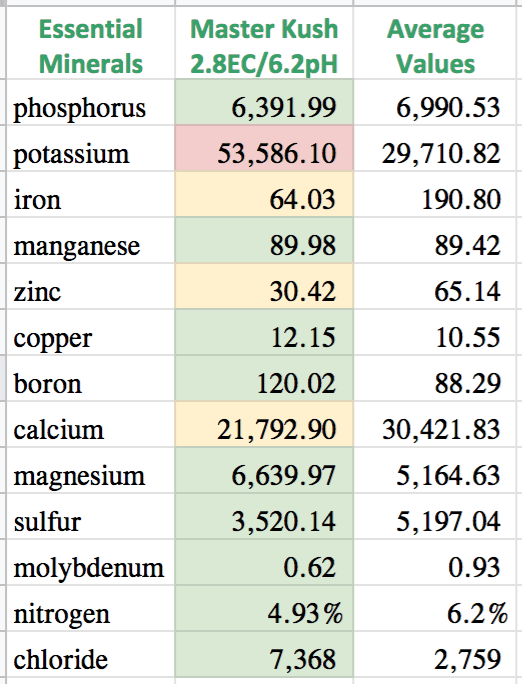Understanding Cannabis Leaf Tissue Testing

Leaf Tissue Analysis Sample Result
The graphic above an example of cannabis leaf tissue lab test results. The results will tell you the quantity of each mineral present in the leaves, which will inform how your nutrient recipe should be adjusted.
I’ve been adjusting recipes based on leaf tissue tests for several years, and I’ve learned the patterns that are common to cannabis, as well as how the minerals individually relate to each other. Some minerals are more or less independent from each other and increase or decrease in the leaf tissue as the quantity is raised or lowered. Other minerals operate in relation to each other and might not increase in the leaf tissue as the quantity is raised in the recipe. Also, the pH of the root zone has a significant affect on uptake patterns; most micronutrients are more available at lower pH’s and macronutrients are more available at higher pH’s.
To complicate matters further, the media you choose to grow in also has its own natural pH and mineral holding tendencies. Rockwool is more neutral where coco coir and soil are more interactive with added minerals. Coir and soil hold some minerals (through a process called Cation Exchange Capacity) in the soil particles, making them less available to the plants.
Only in the past few years have labs available who will test cannabis leaves. This service gives growers insight into plant health like they’ve never had before. It also makes it more more plausible to purchase and mix your own nutrient formulas, since you can check the real-world affects of your recipe using actual scientific data.
If you have a formula that’s already working for you, you can reverse engineer it and mix your own version of it at a huge cost savings. Along with saving about 90% on costs, the process is very satisfying for any serious commercial cannabis grower.
For support in getting your cannabis leaf tissue tested and analyzed, or getting recipes created, mixed and adjusted, contact Jennifer Martin for more information.
